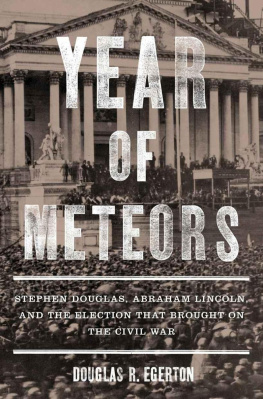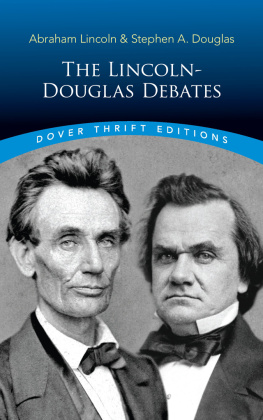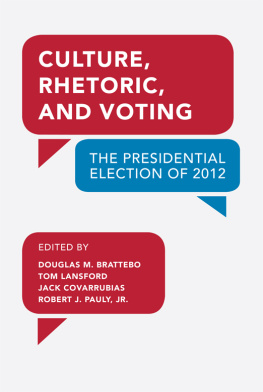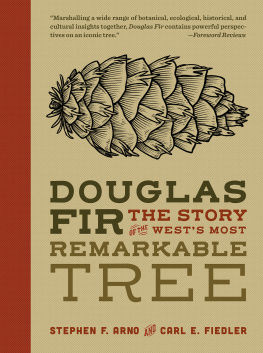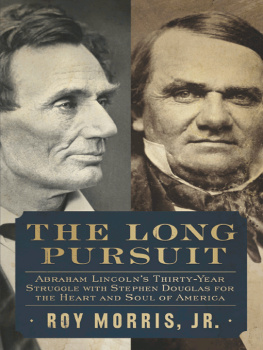
Contents
Let Us Press On: AprilJune, 1861
A Nation with Its Hands Full: The Republic on the Eve of 1860
Douglas or Nobody: The Democrats
Principles and the Duty to Recognize None: The Constitutional Union and Liberty Parties
Moving Heaven and Earth: The Republicans
Beyond the Power of Surgery: The Democrats, Again
Lincoln Is the Next President. I Will Go South: The Campaigns
The Union Is Dissolved: The Lower South Secedes
Others to Share the Burden: Two Governments Prepare
All Our Labor Is Lost: Compromise Committees and the Washington Peace Conference
To Act the Part of a Patriot: MarchApril, 1861
1860 Election Scenarios and Possible Outcomes
For my daughters Kearney and Hannah,
who always make me smile
Year of meteors! brooding year! I would bind in words retrospective, some of your deeds and signs; I would sing your contest for the 19th Presidentiad; I would sing how an old man, tall, with white hair, mounted the scaffold in Virginia; (I was at handsilent I stood, with teeth shut closeI watchd; I stood very near you, old man, when cool and indifferent, but trembling with age and your unheald wounds, you mounted the scaffold;) I would sing in my copious song your census returns of The States, The tables of population and productsI would sing of your ships and their cargoes, The proud black ships of Manhattan, arriving, some filld with immigrants, some from the isthmus with cargoes of gold; Songs thereof would I singto all that hitherward comes would I welcome give; And you would I sing, fair stripling! welcome to you from me, sweet boy of England! Remember you surging Manhattans crowds, as you passd with your cortege of nobles? There in the crowds stood I, and singled you out with attachment; There in the crowds stood I, and singled you out with attachment; Nor forget I to sing of the wonder, the ship as she swam up my bay, Well-shaped and stately the Great Eastern swam up my bay, she was 600 feet long, Her, moving swiftly, surrounded by myriads of small craft, I forget not to sing; Nor the comet that came unannounced out of the north, flaring in heaven; Nor the strange huge meteor procession, dazzling and clear, shooting over our heads, (A moment, a moment long, it saild its balls of unearthly light over our heads, Then departed, dropt in the night, and was gone;) Of such, and fitful as they, I singwith gleams from them would I gleam and patch these chants; Your chants, O year all mottled with evil and good! year of forebodings! Year of comets and meteors transient and strange! lo even here one transient and strange! As I flit through you hastily, soon to fall and be gone, what is this chant, What am I myself but one of your meteors? WALT WHITMAN, 18591860
Let Us Press On
AprilJune, 1861
R ESIDENTS DUBBED SOUTHERN I llinois as Little Egypt, not only because the flat terrain resembled the Nile delta but also because the region exhibited the proslavery attitudes of its ancient namesake. Although the Northwest Ordinance of 1787 allowed neither slavery nor involuntary servitude in the region, settlers who had carried their slaves into the territory before the ordinance were permitted to retain their unwaged laborers. A resident of the aptly named Cairo could gaze east across the Ohio River into Kentucky, while another might face west and spy Missouri. Boatmen sailing down the Mississippi River reached the Tennessee border after forty-three miles. So it was no surprise that public opinion in lower Illinois was bitterly divided following the Confederate bombardment of Fort Sumter on the morning of April 12, 1861. The Golconda Weekly Herald warned residents to arm themselves against black Republican armies, and several city leaders in Cairo threatened to turn the town into an independent city-state. Many who profess to be Union men, fretted one Democrat, hesitate about coming out boldly against treason, fearing hereafter to be classed as Republicans. The state assembly was preparing to go into special session on April 23, and worried legislators peppered Stephen A. Douglas, the states Democratic senior senator, with urgent requests to stand by our Government, and sink party feeling for the present. Douglass health, damaged by a lifetimes fondness for whiskey and cigars, had yet to recover from the grueling fall campaign and a bruising winter legislative session in Washington. But vowing, Let us press on, he resolved to come home to arouse the people in favor of the Union.
On April 20, Douglas and his second wife, Adele, left the besieged national capital by rail; across the river in Virginia, the Stars and Bars, the first of several Confederate flags, flapped in the spring breeze. The Baltimore and Ohio Railroad passed through portions of western Virginia, and when his train reached the arsenal town of Harpers Ferry, southern militiamen boarded the car and threatened to arrest the senator as a prisoner of war. With more courage than realism, the diminutive Little Giant, as the senator was known, warned the soldiers that if they did so, they would have to answer to the largest army that Virginia had yet seen. Cooler heads prevailed, and the senator was sent on his way. On the morning of April 25, Douglass party pulled into Springfield, the Illinois state capital. Although exhausted from his journey, Douglas promptly met with Governor Richard Yates, Republican Illinois senator Lyman Trumbull, and Orville Hickman Browning, a former Whig whom Douglas had bested in an 1843 congressional race. The time for partisanship had passed, Douglas insisted, and together the group forged an understanding regarding the various militia bills pending in the state assembly.
That evening, as legislators and curious residents of the city shoved their way into the packed statehouse, Douglas delivered one of the most important speeches of his career. Once capable of speaking for hours, the weary senator kept his remarks short. But his words were both blunt and emotional, and as he spoke, some in the audience began to weep openly. Uncharacteristically, Douglas began by confessing an error. He had devoted his career to compromise and sectional reconciliation, he admitted, and had lean[ed] too far to the southern section of the Union against my own. As had many northern Democrats, Douglas had once believed that appeasement was the wisest response to southern demands regarding slavery in the western territories. But the fruits of his munificence, he fumed, were a piratical flag unfurled near the White House and the obstruction of Illinoiss commerce along our great river. A wide-spread conspiracy exists to destroy the best government the sun of heaven ever shed its rays upon, Douglas shouted, for a war of aggression and extermination [was] being waged against the republic by proslavery forces. As Douglas paused to catch his breath, somebody entered the rear of the chamber waving an American flag, and the tears in the hall transformed into cheers and applause.
On May 1, Douglas reached Chicago. Journalists waiting at the depot marveled at the crowd of thousands that met his car with a resounding roar. Judging from the throng, one might never have known that the politician returning home had finished fourth in the Electoral College during the previous Novembers presidential election. An impromptu parade escorted Douglas through the streets toward the Wigwam, the cavernous pine auditorium constructed only the preceding year to house the Republican National Convention. According to one reporter, Douglass words rolled out in unbroken cadences of patriotic devotion as they never rolled before. Clutching the podium unsteadily, Douglas assured the ten thousand persons who had elbowed their way into the hall that the election of Abraham Lincoln was merely the excuse for secession. Returning to the theme he had first advanced in Springfield, Douglas charged that the Confederacy was the product of an enormous conspiracy devised months before the fall election. There are only two sides to the question, Douglas thundered in conclusion. Every man must be for the United States or against it. There can be no neutrals in this war, only patriotsor traitors . It was to be his last speech.
Next page
